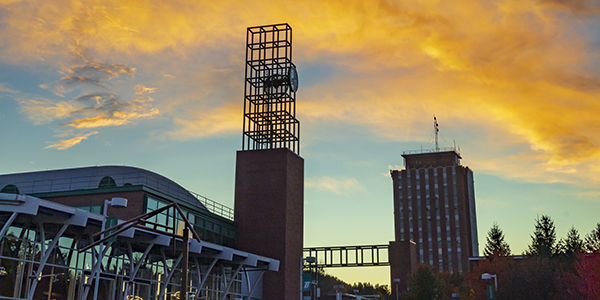What will a return to normalcy look like?

When the worst of the coronavirus pandemic is behind us and New York state’s pause is over, Binghamton University will need to return to a new normal — but what will a post-pandemic normal look like?
A Public Health Advisory Group and six coordinators have been charged by President Harvey Stenger and Provost Donald Nieman to develop recommendations for the University’s “the new-normal” plans.
“As a campus, we were able to come together quickly to move classes online, drastically downsize student housing and learn to work remotely,” said Stenger. “We need similar quick action to do the reverse as we develop plans to ramp back up to our new normal.”
The Public Health Advisory Group, chaired by Associate Vice President for Student Affairs Johann Fiore-Conte, includes:
- Yvonne Johnston, associate professor and founding director of the Master in Public Health program
- Mario Ortiz, dean and professor of nursing for Decker College of Nursing and Health Sciences
- Richard Moose, MD, medical director of Decker Student Health Services Center
- Hiroki Sayama, professor of systems science and industrial engineering
“This group will monitor research and best thinking by public health professionals from across the nation on strategies for universities to accept students back to their campuses and resume in-person instruction,” said Nieman. “Four of the group’s members have expertise in public health, while one has expertise in systems thinking and modeling. Combined, we believe they will be able to provide the guidance we need as we make some very difficult decisions in an uncertain time.”
“The provost and I have also selected individuals to coordinate the planning teams who are knowledgeable, action-oriented and able to quickly identify key leaders and offices from all areas of campus to help in their efforts as they gather information and make recommendations to senior leaders,” Stenger said.
The coordinators for academic areas will consult with deans, faculty and faculty leaders, staff and students, said Nieman. Coordinators for non-academic areas will also use a broad-based approach to gather input.
“We’re not forming committees; we have identified individuals who will reach out broadly, including to shared governance groups, to find those who can best help develop recommendations for how we get back to a bricks-and-mortar model,” Nieman said.
Coordinators and their areas of responsibility are:
- Johann Fiore-Conte: Student and Residential Life
- Mary Beth Curtin: Research
- Donald Loewen: Undergraduate Education
- Krishnaswami “Hari” Srihari: Graduate Education
- Patrick Elliott: Events
- James Pitarresi: Online Instruction and Services Delivery
Coordinators will participate in periodic briefings by the chair of the Public Health Advisory Group, Nieman added.
“In all cases, the coordinator’s role will be to enlist the support of others on campus who possess appropriate knowledge and expertise, monitor what other universities are doing nationwide and develop best practices for Binghamton’s return to normalcy,” Nieman said.
